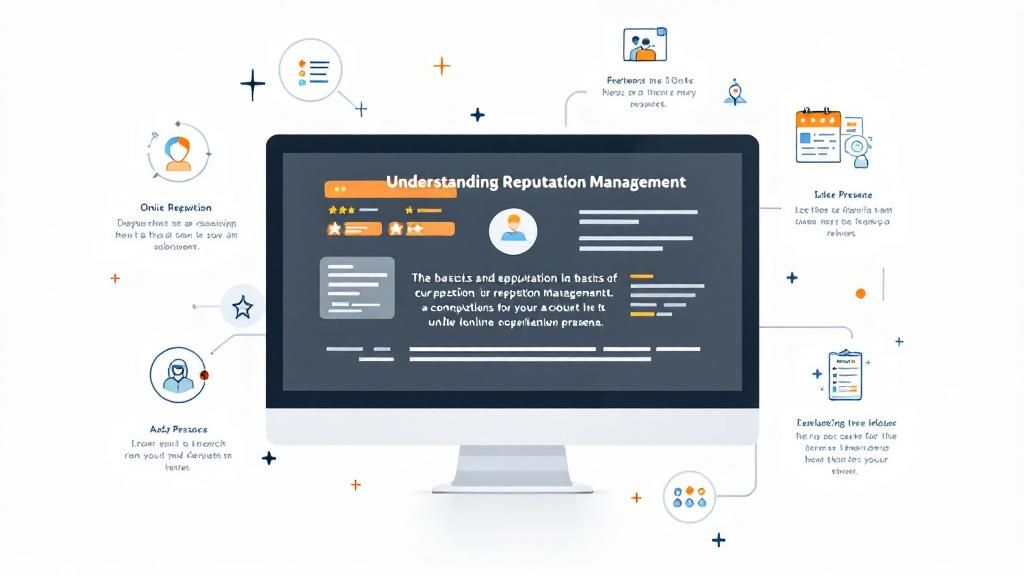
Why Managing Your Online Reputation Matters
In today’s digital age, your online reputation can significantly influence public perception and business success. When you manage your online presence effectively, it builds trust, showcasing your integrity in real time. Consumers increasingly rely on online reviews to make informed decisions. Here, a few negative comments can tarnish your image and potentially hurt your bottom line. Reputation management is crucial as it enables you to control the narrative, emphasizing your strengths while addressing concerns. By utilizing reputation monitoring services, you gain proactive insight into public sentiment, allowing you to maintain or enhance your brand reputation management efforts seamlessly and effectively.

Understanding Reputation Management
Reputation management involves the careful crafting and ongoing maintenance of your online image, ensuring that it aligns with your desired public perception. This involves monitoring, analyzing, and responding to feedback across various platforms. Understanding reputation management is important for businesses and individuals alike, as it directly impacts trust and credibility. By actively engaging in reputation monitoring services, you can gain a clearer picture of how your identity is perceived online.
One unpopular opinion about reputation management suggests that it is not always necessary for smaller businesses. Some argue that with limited public exposure, maintaining a controlled brand reputation management strategy may not yield immediate benefits. However, even for smaller entities, staying aware of online sentiment can prevent issues from escalating and provide valuable insights for growth and improvement. Regardless of business size, reputation management can safeguard your interests and offer a competitive advantage.
Brand reputation management is not just about addressing negative feedback but also amplifying positive interactions. By spotlighting satisfied customers and responding to their reviews, you can foster brand loyalty and attract potential clients. Engaging with your audience in this manner helps to humanize your brand, allowing people to connect with you on a more personal level. This ongoing dialogue reinforces positive perceptions and creates a stronger, more resilient online presence.
Incorporating effective reputation monitoring services into your strategy allows for timely identification of potential crises. By anticipating issues before they escalate, you are better equipped to mitigate risks and maintain a positive image. This proactive approach ensures that you remain in control of the narrative, bolstering trust among your audience. Adopting such measures demonstrates a commitment to integrity, something that resonates deeply with today’s discerning consumers.
A comprehensive reputation management strategy helps bridge the gap between perception and reality. It empowers you to shape the narrative, ensuring that your true values and strengths are accurately reflected online. By understanding the nuances of reputation management, you can effectively protect and enhance your digital identity, fostering sustained success and growth in an ever-evolving digital landscape.

The Impact of Online Reviews
Online reviews are a powerful tool that can shape public perception and influence consumer decisions. These reviews offer personal insights into products and services, acting as modern-day word-of-mouth recommendations. Platforms like Yelp or Google give each review significant weight, making them critical to your brand’s reputation. Both positive and negative feedback are accessible to potential customers, which can either bolster confidence or raise doubts about your offerings.
How do online reviews impact consumer behavior in the digital age? The answer lies in the trust consumers place in peer evaluations. Studies indicate that a majority of people trust online reviews as much as personal recommendations. This trust underscores the necessity for active brand reputation management. By monitoring and responding to reviews, you can maintain control over your narrative, facilitating trust and transparency with your audience.
Negative online reviews can have a detrimental effect on your business’s image. When left unattended, these reviews can spread misinformation or highlight perceived flaws, potentially scaring off new customers. Integrating reputation monitoring services allows you to address customer concerns promptly and effectively. Addressing issues head-on demonstrates to the public that you value their input and are committed to improving their experience.
On the flip side, positive reviews can significantly enhance your brand’s credibility and attract a wider audience. By showcasing customer satisfaction, you naturally encourage others to engage with your business. Implementing a reputation management strategy that emphasizes positive feedback can create a ripple effect, increasing opportunities for word-of-mouth marketing and fostering long-term loyalty.
The impact of online reviews is undeniable in today’s consumer-driven market. They not only influence immediate purchasing decisions but also contribute to the long-term perception of your brand. By understanding how online reviews affect your business and integrating them into your reputation management strategy, you can effectively navigate the dynamic landscape of digital consumer feedback.

Building a Positive Digital Footprint
Crafting a positive digital footprint involves strategic planning and thoughtful execution. It starts with presenting a consistent brand image across all digital platforms, including social media, websites, and online directories. A cohesive digital presence helps you convey your message clearly, enhancing your overall reputation management efforts. By staying consistent, you build a recognizable and trustworthy brand that resonates with your audience.
While many believe that maintaining a positive digital footprint is solely about creating content, there’s a strong case for engaging with your audience to establish authenticity. Interaction through comments, reviews, and social media provides opportunities to demonstrate your values and address consumer feedback directly. This engagement fosters community and trust, essential components of brand reputation management in the digital space.
One crucial aspect of building a positive digital footprint is leveraging reputation monitoring services. These tools allow you to track online mentions and monitor public sentiment effectively. By proactively addressing issues and highlighting positive feedback, you can maintain a constructive image. Consistently integrating these services into your strategy is pivotal for shaping a dynamic and favorable digital presence.

The Cost of Ignoring Reputation Management
Neglecting your reputation management can lead to dire consequences for both your personal brand and business. Without proactive management, negative reviews and misinformation can quickly spread, damaging public perception. The cost isn’t just financial but also affects your credibility and customer trust. As negative content becomes more visible, it heavily influences potential clients’ decisions, steering them away from your products or services.
One of the most frequently asked questions about reputation monitoring services is whether they are worth the investment. Here’s the answer: ignoring these services can lead to unforeseen expenses. By failing to address harmful narratives, you miss the opportunity to mitigate negative impressions before they escalate. The result is a higher cost to repair your image and regain customer trust, which can be far more challenging and expensive than maintaining it.
Brand reputation management is essential for ensuring long-term success in today’s consumer-driven market. Ignoring it leaves you vulnerable to reputational damage that can take years to fix. By integrating proactive measures into your strategy, like regular monitoring and engagement, you safeguard your brand against the risks of neglect and maintain a positive, resilient online presence.

Leveraging Social Media for Reputation Enhancement
Social media platforms are pivotal in shaping and enhancing your digital reputation. They offer direct channels to engage with your audience, share updates, and highlight positive aspects of your brand. This environment allows you to humanize your brand, making it more relatable and trustworthy. By regularly interacting with your followers, you establish a more personal connection, which is fundamental for effective brand reputation management.
One of the challenges in using social media for reputation enhancement is managing real-time feedback, which can quickly spiral into negative exposure if not handled promptly. This issue can be addressed through active monitoring and timely responses. Leveraging reputation monitoring services can help you stay ahead, allowing you to identify potential issues early and respond effectively. By addressing concerns swiftly and transparently, you demonstrate a commitment to customer satisfaction and maintain a positive online presence.

How Search Engine Results Influence Perception
Search engine results hold significant sway over public perception and can heavily influence how your brand is viewed. When people search for your company or name, the information that appears on the first page shapes their initial impressions. Positive content can enhance your credibility, while negative results can cast doubt. This highlights the need for proactive reputation management to ensure favorable search outcomes.
In the next few years, search engine results are likely to become even more personalized, making reputation management crucial to maintaining your image. Advances in algorithms will continue to refine how results are displayed, focusing on user preferences and behavior. This trend underscores the importance of creating diverse and balanced online content that effectively represents your brand across different search queries.
Keeping an eye on search engine outcomes through reputation monitoring services can help you manage your digital presence efficiently. By regularly tracking how your brand appears in search results, you can identify areas for improvement and amplify positive stories. This proactive approach ensures that your brand remains visible in a positive light, fostering trust and loyalty among your audience.



